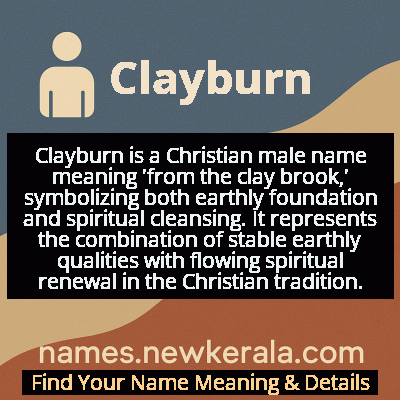Clayburn Name Meaning & Details
Origin, Popularity, Numerology Analysis & Name Meaning of Clayburn
Discover the origin, meaning, and cultural significance of the name CLAYBURN. Delve into its historical roots and explore the lasting impact it has had on communities and traditions.
Name
Clayburn
Gender
Male
Origin
Christian
Lucky Number
6
Meaning of the Name - Clayburn
Clayburn is a Christian male name meaning 'from the clay brook,' symbolizing both earthly foundation and spiritual cleansing. It represents the combination of stable earthly qualities with flowing spiritual renewal in the Christian tradition.
Clayburn - Complete Numerology Analysis
Your Numerology Number
Based on Pythagorean Numerology System
Ruling Planet
Venus
Positive Nature
Harmonious, responsible, caring, and artistic.
Negative Traits
Overly idealistic, superficial, possessive, or jealous.
Lucky Colours
Pink, turquoise.
Lucky Days
Friday.
Lucky Stones
Diamond, turquoise.
Harmony Numbers
2, 3, 9.
Best Suited Professions
Artists, musicians, teachers, healthcare workers.
What People Like About You
Warmth, nurturing nature, artistic flair.
Famous People Named Clayburn
Clayburn Cox
Politician
Served as a prominent state legislator and community leader in the American South
Clayburn LaFleur
Educator
Founded several Christian schools and educational programs in the Midwest
Clayburn Moore
Artist
Renowned sculptor and fantasy artist known for detailed bronze works
Clayburn Griffin
Businessman
Pioneered agricultural innovations and community development in rural areas
Name Variations & International Equivalents
Click on blue names to explore their detailed meanings. Gray names with will be available soon.
Cultural & Historical Significance
The name was particularly common in communities where baptismal symbolism and agricultural life intersected, creating a unique cultural identity that blended practical earthly concerns with spiritual aspirations. In many Christian traditions, clay represents humanity's humble origins and potential for transformation, while flowing water symbolizes grace and renewal. This made Clayburn a meaningful choice for families seeking a name that reflected both their earthly vocation and spiritual calling. The name's persistence in certain regions demonstrates how cultural values can preserve naming traditions that might otherwise fade from common usage.
Extended Personality Analysis
Individuals named Clayburn are often perceived as grounded, practical, and deeply connected to their roots and values. They typically exhibit a strong sense of responsibility and reliability, much like the stable, foundational quality of clay itself. These individuals tend to be patient builders—whether of relationships, careers, or communities—preferring steady progress over quick results. Their connection to the 'brook' element suggests a flowing adaptability and emotional depth that complements their earthy stability, creating a balanced personality that can handle both routine and change with equal grace.
Clayburns are often seen as mediators and peacemakers, able to navigate difficult situations with both firmness and flexibility. They typically possess a quiet strength that others find reassuring and tend to be loyal friends and dedicated family members who value tradition while being open to necessary change. This combination of earth and water elements creates a personality that is both dependable and emotionally intelligent, making them natural leaders in community and religious settings. Their practical wisdom and steady demeanor often make them sought-after advisors and trusted confidants, while their inherent stability provides a calming influence in turbulent situations.
Modern Usage & Popularity
In contemporary times, Clayburn remains a relatively uncommon but respected name, primarily used in Christian communities that appreciate its earthy, traditional qualities. While it never reached mainstream popularity peaks, it has maintained a steady, low-frequency usage particularly in rural areas and among families with strong agricultural or environmental values. The name has seen a slight resurgence in recent years as part of the 'vintage name' trend, appealing to parents seeking distinctive yet meaningful names with historical roots. Modern usage often reflects a desire to honor family heritage while embracing names that convey strength, stability, and connection to nature. It remains more popular in certain regions of the United States, particularly the South and Midwest, where its agricultural connotations and Christian associations resonate strongly with local cultural values.
Symbolic & Spiritual Meanings
Symbolically, Clayburn represents the harmonious union of earth and water—clay symbolizing foundation, form, and human creation (referencing the biblical concept of humanity formed from clay), while the brook represents flow, purification, and spiritual renewal. This combination creates a powerful metaphor for the Christian journey: the earthly vessel (clay) being shaped and cleansed by divine influence (water). The name suggests someone who is both grounded in practical reality and open to spiritual transformation, embodying the balance between earthly responsibilities and heavenly aspirations. Clay symbolizes potential and malleability—the raw material waiting to be shaped into something purposeful—while the flowing brook represents the ongoing process of growth and refinement, making Clayburn a name rich with spiritual and philosophical significance about human potential and divine guidance.

